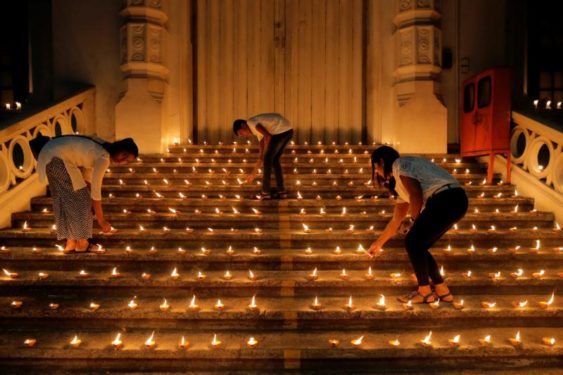By Inés San Martín

ROME (Crux) – After attacks that took the lives of more than 250 people on Easter Sunday, the Catholic Church in Sri Lanka is working on becoming a beacon of hope. Yet according to the local cardinal, if civil authorities don’t find the perpetrators and put them on trial, they risk the community taking justice into its own hands.
“I want to state that we may not be able to keep people under control in the absence of a stronger security program,” Cardinal Malcom Ranjith of Colombo said. “We can’t forever give them false promises and keep them calm.” He urged the government to “implement a proper program in order that the people don’t take the law into their own hands.”
Speaking at a press conference in Colombo on Tuesday, Cardinal Ranjith accused the government of “placing responsibility on others” when it comes to investigating what happened on Easter Sunday, creating a commission to conduct an investigation formed by “pensioners” and retired officials instead of applying the law and guaranteeing the safety of the Christian community.
Cardinal Ranjith said he doesn’t see the government taking the necessary steps to guarantee the safety of students, decreeing that schools should remain closed for the time being.
“I don’t see measures being taken by those in power. Instead, I see a lot of bouncing of responsibilities around,” he said. “The result is that the country and the population continue to suffer. If the current regime doesn’t have the adequate structures to fight terrorism, it will be impossible to contain the masses in the future.”
Cardinal Ranjith, who was made a cardinal by Pope emeritus Benedict XVI in 2010, said that the government shouldn’t “waste time mulling over the past,” and instead, assume the responsibility of putting political differences aside in the search of a solution to the question of national security, hence freeing the country “from this pitiful state.”
The cardinal appealed to all political parties to put political differences aside, addressing President Maithripala Sirisena; Prime Minister Ranil Wickremesinghe; and the head of the opposition, Mahinda Rajapaksa.
During the press conference, Cardinal Ranjith also said that there’s no “coordination” in the security operations and asked several rhetorical questions, such as “who offered support to the terrorists” and who gave them access to the explosives.
Meanwhile, the Catholic Church is doing what it can to bring relief to those affected by the attacks.
“A group of priests, nuns and lay volunteers, along with Caritas staff members, have been visiting all the families and expressing our condolences and solidarity,” said Father Mahendra Gunatilleke, national director of the papal Catholic charity Caritas, in an email to Crux.
While they visit those affected in the bombings perpetrated in the name of ISIS, the group is collecting information on those killed and wounded and the damages caused by the six bombs that exploded in three churches and three hotels to plan a “response program.”
Over a week after the attacks, the overall number of casualties from the attacks is unclear. However, according to the BBC, officials believe children could end up accounting for more than a fifth of the final death toll.
The fact that so many of the victims were children – 45 who’ve died, many more wounded, according to UNICEF – is something worth noting, in a country that has many generations marred by violence and war.
Next month will mark the 10th anniversary of the end of a 30-year civil war between the government and separatist Tamil militants, that cost the lives of some 40,000 to 100,000 civilians. Before the war, that began in 1983, the country saw two bloody Marxist insurrections that led to a brutal and even bloodier retaliation from the government.
At St. Anthony’s Shrine at Kochchikade in Colombo, St. Sebastian’s Church at Katuwapitiya in Negombo and the Zion Church in Batticaloa hundreds of Christians who thronged for the Easter Sunday services as well as guests at three five-star hotels located in Colombo were instantly killed by the series of suicide attacks that commenced at 8.45 a.m. on April 21.
On April 29 ISIS released a video of leader Abu Bakr al-Baghdadi, the first time he’s appeared in a video in 5 years since his 2014 televised sermon declaring the caliphate. According to a translation of the video by Site Intel Group, which provides Jihadist news, in the video Baghdadi refers to the Sri Lankan attack, calling it a revenge for Baghuz, the last ISIS-ruled village in Syria which fell last month. This contradicts the statement made by the Sri Lankan government claiming that the Easter Sunday attacks were revenge for the massacre in New Zealand’s Christchurch mosque.
“We, Caritas and the Catholic Church at large, have been with the affected families and their members from the day of the incident, visiting them in the hospital, their homes and participating in the funerals,” Gunatilleke told Crux.
